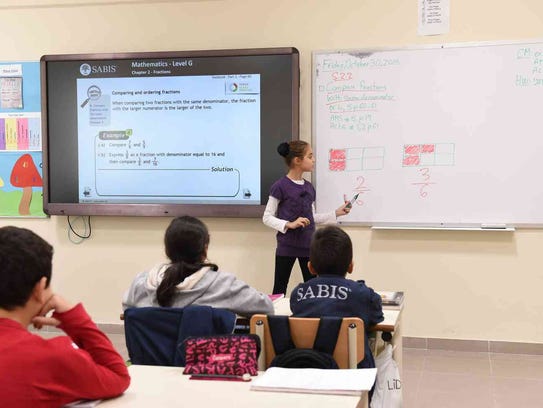SAN FRANCISCO — George and Amal Clooney
are launching an ambitious initiative to educate Syrian refugee
children in Lebanon — and they are getting started with a big injection
of cash and brain power from Google.
The Internet giant’s philanthropic arm Google.org is donating $1 million to the Clooney Foundation for Justice — one of 51 philanthropic efforts from companies around the world announced as President Obama convenes a meeting of world leaders at the United Nations on the refugee crisis. The White House
says corporate commitments for refugee relief total $650 million and
will provide employment opportunities for 220,000 refugees and education
for 80,000 refugees.
With Google’s help, the Clooneys want to
help the more than 250,000 children — about half of the school-age
children in Lebanon — who are not in school. Some have never seen the
inside of a classroom.
“That leads to a horrible outcome a decade from now, a generation from now,” George Clooney
told USA TODAY. “Let’s not lose an entire generation of people because
they happened to be born in the wrong place at the wrong time.”
The
Clooneys’ goal: By next September to enroll 10,000 refugee children in
pop-up schools that teach them everything from math to human rights to
computer coding — all in English. By 2018, they want to enroll 50,000
more.
The movie star-turned-activist and his Lebanon-born,
London-raised human rights lawyer wife are using their celebrity
to turn the spotlight on one of the world’s deadliest battlefields and
its young collateral damage. Countries that welcomed Syrian refugees
such as Lebanon, Jordan and Turkey don’t have the vast resources needed
to educate them.
The Clooneys say they are starting in Lebanon because of the enormity of the challenge there. More than 1.5 million Syrians have relocated to Lebanon since the 2011 uprising against Bashar al-Assad, making the tiny country the largest host of refugees per capita in the world.
That has led to an education gap. In 2009, 94% of Syrian children
were in school, according to the United Nations. Today just four out of
10 Syrian refugee children in Lebanon are enrolled in primary and
secondary schools.
“We want to get every single out-of-school
child in Lebanon an education,” Amal Clooney told USA TODAY. “My own
family left Lebanon when there was a war there, and I couldn’t have done
any of the work I have done without having been able to have
an education.”
The Clooney Foundation for Justice is working with global education
provider SABIS, which has already had success teaching refugee kids in a
school in Lebanon.
“We learned about a specific school they built
in Mtein in the El Mten region of Lebanon,” Amal Clooney said. “We
started thinking about how do we use this model and make it work at a
much bigger scale.”
Temporary schools that use technology in the
classroom will be set up in areas with a high concentration of refugee
children, said Carl Bistany, president of SABIS.
“The plan is to
launch up to 10 schools as close as possible to the communities with the
highest need in September 2017,” he said.
The Clooneys called on Google as its tech partner. (Other partners in the initiative are Virgin Unite and The Radcliffe Foundation.)
“They
were a natural partner for us. And, yes, they were very generous,”
George Clooney said. “But it’s their tech support and their ideas about
that are going to make the difference for us.”
Google.org dedicates 1% of Google profits and a significant chunk of
its employees’ time to challenges it believes it’s uniquely qualified to
address. That includes the refugee crisis.
A year ago, Google
launched its first global matching campaign, raising $11 million from
some 330,00 donors for refugee relief organizations in 48 hours by
putting an ad on its home page. In all, Google says it has committed
more than $16.5 million to refugee relief and 90 employees have put in
more than 1,200 hours on relief projects such as installing Wi-Fi along
refugee migration routes.
Google.org director Jacquelline Fuller
says Google will dispatch employees to make sure Syrian refugee children
get a first-rate education.
“Access to learning and access to
information is so much a core part of our values,” Fuller said. “The
idea that you would have a quarter million refugee children in a place
like Lebanon with half of them not in school, that is an entire
generation who could be contributing to society. This is a cohort of
children we need to invest in.”
Follow USA TODAY senior technology writer Jessica Guynn @jguynn




